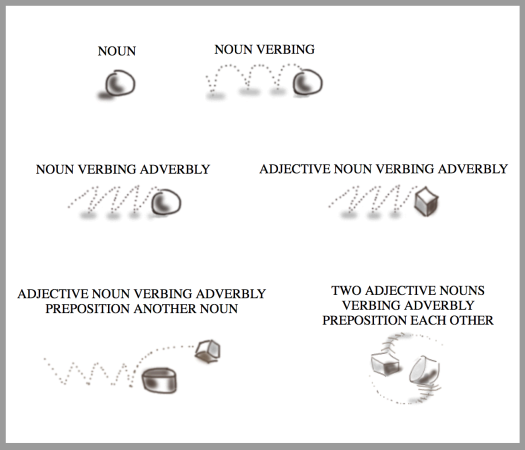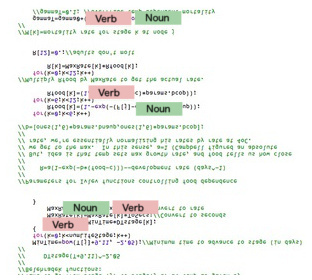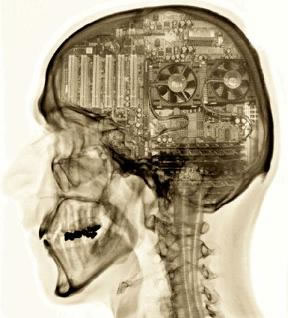Mark Twain said: “Never let school interfere with your education.“
Here’s a math riddle:
“Peter has 21 fewer marbles than Nancy. If Peter has 43 marbles, how many marbles does Nancy have?”
The first sentence requires me to do some linguistic fiddling. There is an implication that both Peter and Nancy possess marbles – but it is not directly stated. The second sentence begins with “If”, which means the primary grammatical elements in the question are postponed until the end. Let’s re-phrase this riddle to say:
 “Peter and Nancy each have a bag of marbles. Peter has 43 marbles in his bag. Peter has 21 fewer marbles than Nancy has. How many marbles does Nancy have in her bag?”
“Peter and Nancy each have a bag of marbles. Peter has 43 marbles in his bag. Peter has 21 fewer marbles than Nancy has. How many marbles does Nancy have in her bag?”
….
This might make the riddle easier to solve. Or it might not. Either way, I can say for sure that all this wordy bullshit is irrelevant to the actual math.
Math, like Music, is a Universal Language
Now consider what it would be like if you were naturally talented in math, and you were faced with a math riddle expressed in English…but English were not your first language. You may have to spend more time on the question, and you may make some critical mistakes. The subtleties of one language may not translate to another language, causing you to trip up.
We are playing with words here. Now, playing with words is fine; it’s part of how we learn to speak, listen, read, and write. In fact, playing with words that have mathematical content is a good exercise. But this should not come into play for testing students on math skills. The problem (as always) is in the testing.
Here’s another one:

WTF does “spends one hour in the store” mean? Is this just narrative fluff, or is there some clever hint in there?
If I had been presented with this problem as a young student, I would have spent some time mulling over “spends one hour at the store”. However, this is irrelevant and unrelated to the answer.
How to Obfuscate Mathematical Thinking With Clever Language
For dyslexic students, students who learn through action (kinesthetic learners), students who are visual thinkers, and students who learn best by building things, this wordsmithing can be a recipe for failure.
In the real world of adults getting things done and making a living, math is rarely experienced in the form of clever riddles. Math – at its best – is manifested deep within the texture of our daily actions.
Here’s another one:
Let’s think about this. I “have” 24 cookies. (That’s a lot of cookies – why would I have so many cookies?) I “want” to share them with 6 people. Okay. I have a desire to share cookies. So far so good. I’m a generous guy! But then the second sentence appears unrelated: “How many cookies would each person get?” Wait a minute: am I about to give these cookies to these people? And what exactly does “equally” mean?
I know it may seem trivial for me to analyze these details. As an adult I know what this sentence means. But as a young student, I may not have had the full vocabulary or grammatical wherewithal to jump right to an answer. Also, as a “narrative learner”, I would have really wanted to make sure I understood the characters involved, their motivations, etc. I could imagine getting easily get swept up by the storyline (simple as it is).
In short, by working out the characters of this story and their motivations, I may not actually be doing math: I might be engaging in language craft and storytelling. Which is great! But this should not interfere with my being tested on my innate math skills.
Here’s another:
The tense of this little story jumps back and forth between past and present. At age 55, I am now quite facile with language, but when I was 10, I would have had to put in some effort into parsing these shifts in tense.

In fact, my language skills were quite poor when I was 10, and this had an impact on all my school subjects (not just math). Later in life, after I had escaped school and actually started to gain some relevant skills, MIT offered me an opportunity to earn a Master’s degree. They did not ask me any math riddles. MIT knows better than that.
Language
One might argue that language skills are fundamental and important for learning most anything. That’s accurate. Reading, writing, speaking, and listening are fundamentally useful, and the better you are at language, the better you are likely to become at most other skills.
If this is the case, we might conclude that mixing grammatical sentence structure with mathematical logic is a valuable skill.
Indeed.
But school curriculum designers should not confuse the ability to parse a cleverly-crafted sentence with one’s innate mathematical abilities.
The problem, as always, is with TESTING.
I’ll close with this:
An Open Letter to the Education System: Please Stop Destroying Students



 Now, to be sure, I wasn’t expecting epiphanies to come tumbling out. After all, Richard Feynman famously said, “If you think you understand quantum mechanics, you don’t understand quantum mechanics.”
Now, to be sure, I wasn’t expecting epiphanies to come tumbling out. After all, Richard Feynman famously said, “If you think you understand quantum mechanics, you don’t understand quantum mechanics.”



 Graduating to C++ made a positive difference. Object-oriented programming affords ways to encapsulate the aspects of the code that are close to the metal, allowing one to ascend to higher levels of abstraction, and express the things that really matter (I realize many programmers would take issue with this – claiming that hardware matters a lot).
Graduating to C++ made a positive difference. Object-oriented programming affords ways to encapsulate the aspects of the code that are close to the metal, allowing one to ascend to higher levels of abstraction, and express the things that really matter (I realize many programmers would take issue with this – claiming that hardware matters a lot).


